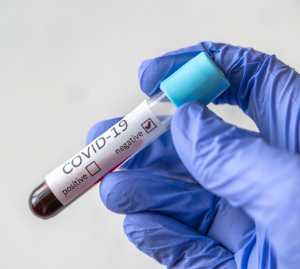I’m sure by now you’ve probably heard the words “coronavirus” and “testing” in the same sentence. Yet, for most people, coronavirus testing is still somewhat of a mystery. We’ve broken down the expert information in one place for clarity on what tests are out there and what it all means.
What types of coronavirus tests currently exist?
- PCR or Diagnostic Testing – PCR tests can tell you whether or not you are currently infected with COVID-19. They are the type of test patients are most likely to encounter right now. They test for the presence of genetic material from the actual virus within mucus in your nose and mouth, which means the virus must be in your body (and in sufficient enough quantity) at the time of the test. If you test positive, you are currently either sick with coronavirus or infected but not having symptoms. If negative, you do not currently have the virus in your body, meaning you are not infected with coronavirus and not contagious.
- Antigen Testing – Antigen tests can also tell you whether or not you are currently infected with coronavirus. They are easy to use and return results rather quickly (usually, while you wait), but aren’t as foolproof as PCR testing. For that reason, and until more research is done to ensure quality, they may be typically used as a screening tool for large groups of people, and then the PCR test will be used for anyone who tests positive by the antigen test.
- Antibody Testing – This is a blood test that measures whether your immune system is creating or has created immunity (aka “antibodies”) against the virus in question. It does not test for the actual virus. In this case, the virus does not have to be in your body at the time of testing (but could be). It gets a bit complicated on what “positive” means in this case, so I’ve left that explanation for another blog post (check out “The science behind coronavirus testing”). But, basically, if positive, you either currently have the virus in your body or have had it in your body in the past.
How reliable is each test?

Generally, PCR tests are very reliable. However, in order for this test to accurately detect the virus in your body, it’s necessary that the virus has had enough time to multiply and actually get into the mucus in your nose and throat. Said another way, the test may be negative for the first few days after you are infected. If you think you have the virus, have been exposed and/or are exhibiting symptoms, even with a negative test you should still self-isolate to prevent possibly spreading COVID-19 or whatever is causing your current symptoms.
Antigen tests are not as reliable as PCR tests, so may be used as a screening tool and the step before PCR testing. Keep in mind that the same goes for antigen testing as it does for PCR testing—it may take a few days (after you are infected) before this test becomes positive, as it requires a sufficient amount of the virus to be in your mucus.
While antibody testing has been around for a long time, it is still unclear how effective antibody testing for coronavirus actually is at the moment. Unfortunately, there just isn’t enough evidence yet. We still need to prove that having had the infection before will protect you from future infections by a similar, yet different form of COVID-19. Per the Centers for Disease Control and Prevention, “We do not know yet if having antibodies to the virus can protect someone from getting infected with the virus again, or how long that protection might last.”
How can I access coronavirus testing?
COVID-19 testing is more available now than when the outbreak first occurred. There are fewer restrictions on testing so if you are worried that you need a test, and have symptoms, you are more likely to be able to access one. If you are currently having symptoms, you should talk to a nurse first (assuming it’s not an emergency; if it is you should get help by calling 911 or going to the ER), or call your primary provider to decide if you should be seen for a visit or just need the testing.
Many places may require a medical order from a provider in order to get the test done so don’t expect to drive up like at a Dunkin’ or Starbucks to order yourself that test. Call ahead to the testing site or check with your provider first. Some providers want to rule out other, more common reasons for fever, especially in pediatrics, so they may have you come into the office for a strep or influenza test first, for example. In some cases, you may be able to do an online screening to determine if you need the test. Some high risk patients such as health care providers, immunocompromised patients, elderly, those experiencing severe symptoms and those with exposure risks are likely to have testing more available to them.
Per the Coronavirus Aid, Relief and Economic Security (CARES) Act, antibody testing should be covered by your insurer. Many insurers are also waiving copays or deductibles for coronavirus related testing. However, we suggest calling your insurer to confirm or checking this website to get specific information regarding your insurer as some coverage is time limited.
The CDC lists each state’s health department website for more specific information on testing sites available in your area along with other COVID-19 resources.
– Igor Shumskiy, MD